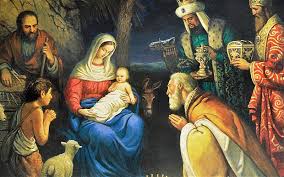“God said, ‘You shall not eat of the fruit of the tree that is in the midst of the garden, neither shall you touch it, lest you die.’” But the serpent said to the woman, “You will not surely die. For God knows that when you eat of it your eyes will be opened, and you will be like God, knowing good and evil.” (Gen 3.3-5 ESV)
Today it seems that man, created in the image of God, has culture by culture, demographic by demographic, man by man, turned the tables on God and made his culture or himself out to be a demigod, the creator of his preferred god — in his own image.
In this sense, man has become like God. He has forgotten how he was dependent on God his creator, the source of his origin, and how many have made her- or himself out to be his own creator and judge. It has become the collective consciousness of the general human race, culture by culture and alas Christendom, as more slip outside of the Narrow Gate, of the Way of Life.
What God had given man to be, man now desired to be through himself. But God’s gift is essentially God’s gift. It is the origin that constitutes this gift, as the image of God draws his life from the origin of God, but the man who has become like God draws his life from his own origin. 1
Dietrich Bonhoeffer’s ethics offer insight into how this has occurred, to the degree of how a man as god, did manifest into the self-created collective evil of the Hitler/Nazi regime which he stood against (eventually he was martyred). History proves that man certainly knows both good and evil.
This secret has been stolen from God by man in his desire to be an origin on his account. Instead of knowing only the God who is good to him and instead of knowing all things in Him, instead of accepting the choice and election of God…he has become like God, but against God. Herein lies the serpent’s deceit…he acquires this knowledge only at the price of estrangement from the origin, the good and evil that he knows are not the good and evil of God but good and evil against God….good and evil of man’s own choosing, in opposition to the eternal election of God. 2
In the garden story of Genesis, we find the metaphor of the acquisition of the knowledge of good, along with evil, signified the complete reversal of man’s ordained insight. Firstly he knew only good, without knowing anything of evil, which had previously only been the sole understanding of God who knew man was given free will, fully capable of potential evil.
We must conclude that this original knowledge of good included both good and its antithesis, evil, as only Yahweh-God’s sacred ground of governing knowingness. Evil is the opposite of “good,” when it disobeys God’s laws of Grace, based on his primary laws of Love.
The history revealed in the Word of God, recognises that God often uses man’s evil as a poignant force to discipline his own once-devout wavering children, with the intention of warning him from consequences of folly, to the degree the New Testament warns:
“And have you forgotten the encouraging words God spoke to you as his children? He said, “My child, don’t make light of the LORD’s discipline, and don’t give up when he corrects you.” (Heb 12:5)
This quote derives from the writings of Moses. (Deut 8:5) Those covenanted by agreement to His laws, in the old covenant were promised direct disciplinary intervention by Yahweh, though in some cases discipline, as with Moses, may take years to manifest. (Cf. Moses, Achan, Judah’s King Zedekiah, Nabal).
The Bible indicates to us that God is the first source of and the only One who knows both good and the opposing potential to choose evil by man’s free choice. The potentiation of actionable evil is existent in His created universe. Evil is the antagonist willing against good or God, by man’s abuse of any potential application of the principles of good.
God knows the potential of man to misuse creation, to think and act out evil – to not love, but rather to hate and destroy as love’s opposite. Jesus said, “the devil comes only to steal and to destroy”. The Satanic mind, originated in sentient beings once subject to God’s dominion, as his created beings, flirted with this potential to enact the opposite of God’s will as seen in the Eden temptation story.
All life is a progressive metaphor, to which mortal beings are a part thereof, a truth I see again and again as I read scripture. For, e.g., prophecy is often presented by God as a metaphor (such as the vision/dreams of Joseph, Daniel, and John). Metaphors of the Bread and Water of Life, or the covenant symbolised by communal wine, in the life of Christ, are supreme metaphors of a reconciling God offering His Son to die in our place.
Man in the flesh flirts with temptations, to tether out every potential tangent of evil we now see in the race. In this sense, St. Paul’s prince of the power of the air is the supreme metaphor at the pinnacle of the consciousness of man opposing the divine prerogatives of good, ideas seeking access via the discerning portal gate of our mind. Decisions, in lock-step by cause and effect, proceed consequentially to the physical actions of life, good or evil based on the embryonic acts of the will.
Only God, the creator of all atomic matter, should ever consider knowing the mechanics of managing men on earth either by protecting His loyal followers or warning them or by pitting man’s evil motives against the perpetrators. In many cases, the Bible reveals stories of how he uses evil against His disobedient straying ones when they flagrantly forget His Sovereignty as creator over man and His Grace offered to them to live by love alone. For example, Jeremiah when rebuked harshly by a false prophet of the king of Judah, immediately prophesized that the liar would be dead within the year:
“Then Jeremiah the prophet said to Hananiah the prophet, “Listen now, Hananiah, the LORD has not sent you, and you have made this people trust in a lie. “Therefore thus says the LORD, ‘Behold, I am about to remove you from the face of the earth. This year you are going to die, because you have counselled rebellion against the LORD.’” (Jer 28:15-16)
Man can and has usurped God’s commanding dominion, and His prophetic voice heard in the Scripture via the Holy Spirit. Our discerning will and conscience must be submitted to God so that we can understand:
…the mystery of an eternal dichotomy which has its origin in the eternal One, the mystery of an eternal choice and election by Him in whom there is no darkness but only light. To know good and evil is to know oneself as the origin of good and evil, as the origin of an eternal choice and election. 4
God is the one and eternal origin of our lives, the overcoming master of all delusion of all the demigods who would choose to usurp his universal Creator-Mind. He is the mighty rearranger of those who use their mind and actions to perpetuate evil, causing disunion against his prescribed royal law to which Christians covenant in Christ, in the sanctifying new covenant of God.
King Nebucanneazer became instantly insane for seven years when he glorified himself as creating his kingdom when it was God who raised him up to discipline the Jews. When his sanity returned he praised the God of the Jews (see Dan 4:28-37). It is noteworthy that the discipline worked:
“When my sanity returned to me, so did my honour and glory and kingdom. My advisers and nobles sought me out, and I was restored as head of my kingdom, with even greater honour than before. “Now I, Nebuchadnezzar, praise and glorify and honour the King of heaven. All his acts are just and true, and he is able to humble the proud.” (vs. 36-37)
In the scriptures, when looking at history, the choice of God to stop access to the tree of life now makes sense. (Gen 3:22, 24) Though it is recorded as occurring, it also is the metaphor of how man disobeyed and turned against God to accept knowing evil as the antithesis of good (as offered by Satan to Adam and Eve).
Boil it down, draw a line in the sand, we all know that evil remains essentially the opposite of obeying God’s direct commands made to us — even if it is the still small voice of the Spirit (1Kings 19:2). The human race was delivered over to the opposite of the good happiness of love and life, to the terrors of death, which is the end/outcome of dominant evil which is the destruction of the operative love in man’s mind as resident good. Bonhoeffer notes that “Man’s life from Eden was in disunion with God, with men, with things and with himself.” 5 Now inter-generational physical death has passed unto all men.
It is this disunion with God that Christ came to atone for, to redeem man from his fallen nature – from his constant flirting with evil — to reconcile him with his creator in the new creation of his mind:
“But God demonstrates His love toward us, in that while we were yet sinners, Christ died for us. Much more then, having now been justified by His blood, we shall be saved from the wrath of God through Him. For if while we were enemies we were reconciled to God through the death of His Son, much more, having been reconciled, we shall be saved by His life. And not only this, but we also exult in God through our Lord Jesus Christ, through whom we have now received the reconciliation”. (Rom 5:8-11 NASB)
1 Dietrich Bonhoeffer, Ethics, italics mine
2 Ibid
3 Glen Jackman’s paraphrase of Bonhoeffer with additional insights
4 Dietrich Bonhoeffer, Ethics




